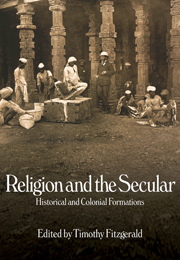Book contents
- Frontmatter
- Dedication
- Contents
- Acknowledgements
- Contributors
- Introduction
- 1 Dialectics of conversion: Las Casas and Maya colonial Congregación
- 2 A higher ground: the secular knowledge of objects of religious devotion
- 3 Secularizing the land: the impact of the Alaskan Native Claims Settlement Act on indigenous understandings of land
- 4 The formative process of State Shinto in relation to the Westernization of Japan: the concept of ‘religion’ and ‘Shinto’
- 5 Religious and secular in the Vietnam War: the emergence of highland ethno-nationalism
- 6 Colonialism all the way down? Religion and the secular in early modern writing on south India
- 7 Understanding politics through performance in colonial and postcolonial India
- 8 Real and imagined: imperial inventions of religion in colonial southern Africa
- 9 Religion in modern Islamic thought and practice
- 10 Rudolf Otto, cultural colonialism and the ‘discovery’ of the holy
- 11 Encompassing Religion, privatized religions and the invention of modern politics
- 12 Colonialism and the myth of religious violence
- Index
9 - Religion in modern Islamic thought and practice
- Frontmatter
- Dedication
- Contents
- Acknowledgements
- Contributors
- Introduction
- 1 Dialectics of conversion: Las Casas and Maya colonial Congregación
- 2 A higher ground: the secular knowledge of objects of religious devotion
- 3 Secularizing the land: the impact of the Alaskan Native Claims Settlement Act on indigenous understandings of land
- 4 The formative process of State Shinto in relation to the Westernization of Japan: the concept of ‘religion’ and ‘Shinto’
- 5 Religious and secular in the Vietnam War: the emergence of highland ethno-nationalism
- 6 Colonialism all the way down? Religion and the secular in early modern writing on south India
- 7 Understanding politics through performance in colonial and postcolonial India
- 8 Real and imagined: imperial inventions of religion in colonial southern Africa
- 9 Religion in modern Islamic thought and practice
- 10 Rudolf Otto, cultural colonialism and the ‘discovery’ of the holy
- 11 Encompassing Religion, privatized religions and the invention of modern politics
- 12 Colonialism and the myth of religious violence
- Index
Summary
INTRODUCTION
In 1985, Richard Martin edited a collection of essays (Martin 1985) on the study of Islam from the perspective of the history of religions. The essays invited and challenged specialists in the study of Islam to employ tools in the history of religions for the study of texts, symbols and traditions of Islam. The volume produced some excellent insights through case studies on early Islam, conversion, pilgrimage and hermeneutics. It was a clear demonstration that the categories and theoretical models in the study of religions could be applied to the study of Islam, and yield some fascinating results. The essays have been widely read and discussed, and other panels and discussions at international meetings have highlighted the need to develop critically similar tools and perspectives from religious studies for the understanding of Islam. In spite of the notable advance in some institutions, however, there is still only a hesitant acknowledgment that the categories developed in the wider discipline might be profitably employed for understanding Islam and Muslim societies. Graham's review of ritual theory for the understanding of Islam is one of few such studies, but his conclusion was that Islam was unique in its approach to ritual. According to Graham, none of the available theories threw light on the inherent revisionary nature of Islamic rites (Graham 1983: 70-71).
The hesitance has been shared by other text-based world religions such as Christianity and Judaism.
- Type
- Chapter
- Information
- Religion and the SecularHistorical and Colonial Formations, pp. 177 - 192Publisher: Acumen PublishingPrint publication year: 2007



